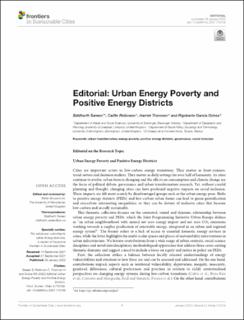| dc.contributor.author | Sareen, Siddharth | |
| dc.contributor.author | Robinson, Caitlin | |
| dc.contributor.author | Thomson, Harriet | |
| dc.contributor.author | Ochoa, Rigoberto García | |
| dc.date.accessioned | 2023-04-03T09:15:03Z | |
| dc.date.available | 2023-04-03T09:15:03Z | |
| dc.date.created | 2023-01-31T09:03:41Z | |
| dc.date.issued | 2022 | |
| dc.identifier.citation | Sareen, S., Robinson, C., Thomson, H., & Ochoa, R. G. (2022). Urban Energy Poverty and Positive Energy Districts. Frontiers in Sustainable Cities, 110. | en_US |
| dc.identifier.uri | https://hdl.handle.net/11250/3061707 | |
| dc.description.abstract | Cities are important actors in low-carbon energy transitions. They matter as front-runners, trend-setters and decision-makers. They matter as daily settings for over half of humanity. As cities continue to evolve, urban form is changing and the effects on consumption and climate change are the focus of political debate, governance and urban transformation research. Yet, without careful planning and thought, changing cities can have profound negative impacts on social inclusion. These impacts are felt most acutely by disadvantaged groups such as the urban energy poor. Shifts to positive energy districts (PEDs) and low-carbon urban forms can lead to green gentrification and exacerbate intersecting inequalities, or they can be drivers of inclusive cities that become low-carbon and socially sustainable.
This thematic collection focuses on the contested, varied and dynamic relationship between urban energy poverty and PEDs, which the Joint Programming Initiative Urban Europe defines as “an urban neighbourhood with annual net zero energy import and net zero CO2 emissions working towards a surplus production of renewable energy, integrated in an urban and regional energy system1” The former refers to a lack of access to essential domestic energy services in cities, while the latter highlights the multi-scalar spaces and places of sustainability interventions in urban infrastructure. We feature contributions from a wide range of urban contexts, social science disciplines and novel interdisciplinary methodological approaches that address three cross-cutting thematic domains and suggest a need to include a focus on equity and justice in policy on PEDs. | en_US |
| dc.language.iso | eng | en_US |
| dc.publisher | Frontiers Media S.A. | en_US |
| dc.rights | Navngivelse 4.0 Internasjonal | * |
| dc.rights.uri | http://creativecommons.org/licenses/by/4.0/deed.no | * |
| dc.title | Editorial: Urban energy poverty and positive energy districts. | en_US |
| dc.type | Journal article | en_US |
| dc.description.version | publishedVersion | en_US |
| dc.rights.holder | The authors | en_US |
| dc.subject.nsi | VDP::Samfunnsvitenskap: 200 | en_US |
| dc.source.journal | Frontiers in Sustainable Cities | en_US |
| dc.identifier.doi | 10.3389/frsc.2021.775705 | |
| dc.identifier.cristin | 2119330 | |
| cristin.ispublished | true | |
| cristin.fulltext | original | |
| cristin.qualitycode | 1 | |

